‘If hip-hop has an official religion, it is Islam.’
Harry Allen, Public Enemy’s ‘Media Assassin’
It began with the ‘First Lady’ of Islamic hip-hop, Miss Undastood. A social worker by day who moonlights as an emcee, the New York-based rapper, described as the Muslim answer to Eve and Foxy Brown, was perhaps the only well-known female Muslim rapper at the turn of the millennium. With her slick lyricism in underground rap battles, community gatherings and more recently on Instagram, Miss Undastood has boldly rapped about domestic violence, the struggles of single parenthood, her lived experiences as a Black woman, and quarantining in the age of the coronavirus.
However, when Syrian-American rapper Mona Haydar released her superb debut single, ‘Wrap My Hijab’ in 2017, mainstream media and some sections of the Muslim community celebrated her as the ‘first’ female Muslim emcee. It was a dismissal of the legacy of a genre born from the Afro-diasporic experience in the 1970s as a defiant riposte to crippling social inequalities and white supremacy in the United States. A long history of anti-Black racism within the non-Black Muslim community prompted the erasure not just of Miss Undastood’s formidable contribution, but also other Black female artists across the Muslim Atlantic in the United Kingdom where Sukina Douglas and Tanya Muneera Williams, formerly known as Poetic Pilgrimage, were the first female Muslim emcees in Britain.
A new generation of female Muslim emcees, in the United States especially, have emerged in the last decade to carry the hip-hop mantle of their predecessors: Alia Sharrief, twin rap duo Ain’t Afraid, Boshia-Rae Jean, Sister Keylani, Neelam Hakeem, and Mona Haydar, to name but a few. These veritable goddesses of hip-hop use their music to celebrate their womanhood, their racial identity, and their faith, offering unapologetic social and political lyrical commentary on the issues of our time from the Black Lives Matter movement, the erasure of Black Muslims from Islam, the hyper-sexualisation of women, and masculinity, to Donald Trump’s anti-immigration policies. These women are cultural innovators and bridge builders reaching out not just to the Muslim community but the non-Muslim community as well.
Miss Undastood began rapping when she was eleven years old. Shortly after her conversion to Islam, following the footsteps of her Catholic father, it was in the school grounds of her ‘strict Islamic school’ where the First Lady of Islamic hip-hop came into sonic being. ‘I was just trying to bring some light to the school lunch hour. It was very dry, very boring. So I started putting together lyrics. I found myself having to hide them, so certain girlfriends would meet me in the bathroom, and I might share my raps. It was mainly just a bunch of rhyming words. No themes’, she says. The earliest song she wrote about her journey to Islam, One World, in which she raps, ‘I was born Muslim, baptised Catholic’; nods to her early Catholic upbringing and the idea that all of humanity are born Muslim, thus any ‘conversion’ to Islam is a reversion. Growing up, her inspirations were female emcees like Salt-N-Pepa, Queen Latifah, Yo-Yo, and Heavy D. When she was a teenager, her attention shifted to Lil’ Kim, Foxy Brown, The Fugees, and Nas; the former Fugees frontwoman, Lauryn Hill, was her favourite.
At the time Miss Undastood began performing publicly in the early 2000s in talent shows, bloc parties, jails, walimahs (Islamic wedding receptions), and college shows, there were no other Muslim women emcees. The question of whether Muslim women could perform in public was then and still is somewhat controversial within certain sections of the Muslim community who hold the opinion that a Muslim woman’s voice is awrah, something that should be reserved in private for members of her family. Her stage name came from the frustration that her intentions were being misconstrued:
Whenever I wanted to talk on political topics or stuff that’s taboo, people were taking things out of context, twisting a lot of the words and making my intentions look negative. I was just being a ‘feminist’, or a ‘man-hater’. Being a Black Muslim woman in hip-hop, it’s not easy. For starters, it’s a male dominated industry. But then you add the component that you’re Black, when you bring the Muslim element, you always have the problem of what people think our religion says. ‘You should be seen not heard’, ‘You shouldn’t be on stage’, ‘You shouldn’t be on display’. It’s difficult with all those three things combined to try to do hip-hop. Then we have the haraam police. When I first started, they used to say things like I was hip-hopping my way to the hell fire. Sometimes people would send their kids to the stage to tell me to shut up. The fact that I rap makes men feel like I’m not religious enough, that I’m not pious enough. ‘Oh, you’re doing that? You can’t be on your religion. You can’t be on your deen (faith)’.
Hip-Hop and Misogyny
Across the Muslim Atlantic in the United Kingdom, Tanya Muneera Williams and Sukina Douglas, who met at a high school choir in Bristol, formed Poetic Pilgrimage in 2002. Though they became the first British female hip-hop group after they converted to Islam in 2005, the name of their group captured their own spiritual odyssey for meaning and knowledge before their conversion and their desire to elevate the voices of Black British women. Sukina recalled the early days when the reaction to their music within the Muslim community was so visceral, they were kicked off tours and accused of leading Muslims to hell by promoting haraam (forbidden) music. ‘Our biggest issue’, Sukhina said
was being Muslim women performers within the Muslim community. People were not used to having women speaking so courageously and so fiercely about what they believed, in the context of the Muslim community in Britain. As much as there were many people who loved us, we had a lot of people who disliked what we were doing.
Another early female Muslim rapper braving crowds and community halls still ambivalent about Islamic hip-hop and female emcees, was Alia Sharrief, a California-based emcee, human rights activist and hip-hop teacher. Sharrief is the founder of The Hijabi Chronicles, a collective which provides a creative sanctuary for Muslim women and teens, that hosted the first all-female concert showcasing the talent of Muslimah emcees in Oakland. She began performing from the age of four when she created a rap duo with her sister. After several scuffles with school bullies, it was her grandmother, the prominent civil rights activist, Margaret Stroud Block, who inspired her to write instead of fight. ‘I was a little kid with a hijab’, she said. ‘My school peers were trying to test my gangsta, but I had a little smart mouth. One day my grandma was like, “Girl you got to pencil-whoop them. Use your words.” So instead of whooping them, I started writing everything out.’
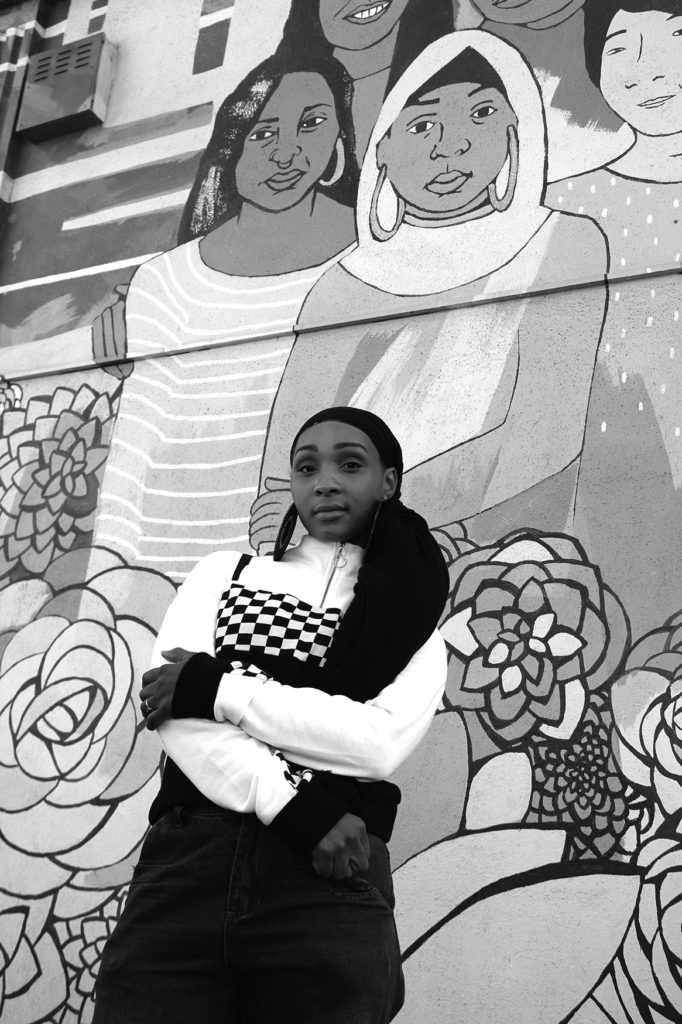
in Oakland, California. Credit: Aina J Khan
The objection towards Islamic hip-hop goes beyond the interpretation that all music except for percussion instruments are prohibited according to a well-known ruling. Hip-hop, in particular, elicits an incendiary response from some sections of the Muslim community because of the idea that the practices of Black and Latino communities where hip-hop sprung from are ‘un-Islamic’. In the American context, the cultural practices of immigrant Muslims from South Asia, what American scholar of Islam, Sherman Jackson terms ‘Immigrant Islam’,has surreptitiously been presented as ‘authentically’ Islamic. It’s this assumption that led many to dismiss Sharrief, Miss Undastood and Poetic Pilgrimage’s artistry as haram. The Muslim community, Sharrief says, ‘would reject us. They said we were “too strong”, “too Black”, “too much like Malcolm X”. The first time I got called a nigger was at the mosque’.
Muslim community’s rejection was also a product of the fact that the commercial ascent of hip-hop in the 1990s was characterised by Notorious B.I.G.’s lyrical salvo of ‘tits and bras, ménage à trois, sex in expensive cars’, and the sex-positive lyricism of female artists like Lil’ Kim and Foxy Brown. Much of the commercial hip-hop that emerged from that decade cast an aesthetic of shimmering hedonism, misogyny, and the objectification of women over a music genre that was once a sentient response to urban deprivation and trenchant police brutality in America. It wasn’t that hip-hop was from its inception, patriarchal. As Saud Abdul Kabeer, Michigan-based hip-hop scholar and author of Muslim Cool: Race, Religion, and Hip-Hop in the United States, explains, hip-hop was a product of its environment where patriarchy had diffused itself into the way it was narrated historically, such that the birth of hip-hop begins with the masculine origin story of the Bronx Big Three: ‘When people talk about the history of hip-hop, they talk about the godfathers, the forefathers. There’s acknowledgement of male DJs like Grandmaster Flash, Afrika Bambaataa, and DJ Kool Herc. But there are no women in that story.’
In the mid 1980s, Queen Latifah was one of the first female emcees to normalise Afrocentric hip-hop aesthetic in the form of head wraps and kente prints. Carolyn Rouse’s research on American Black Muslim female converts builds a picture of the alignment of these Afrocentric practices with Black Muslim practices. Rouse suggested Black Muslim women whose identities sat at the intersections of their Blackness, their womanhood, and their Americanness, chose to cover their hair and bodies as Muslims not just to embrace their spiritual identity but also to reject feminine beauty standards of white supremacy and internalised self-loathing the writer Toni Morrison admonished so poignantly in her novel, The Bluest Eye. Whilst ‘Immigrant Islam’ dictated that modesty for Muslim women could be exhibited only through Arab and South Asian inspired hijabs and chaadars, Muslimah rappers like Alia Sharrief and Neelam Hakeem, notes Khabeer, observe modesty and salute their African heritage by, ‘reclaiming Afrodiasporic headwraps as Islamic’ and adorning themselves with jewellery shaped in the African continent.
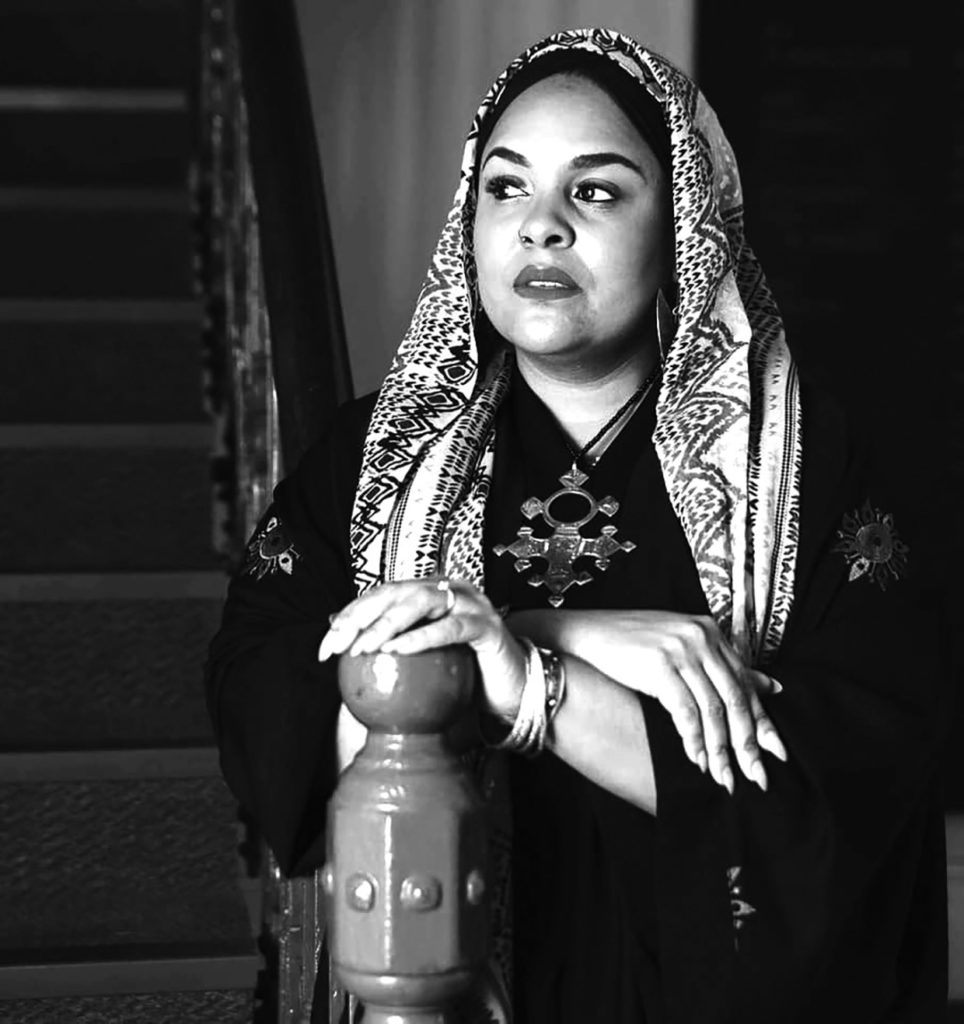
Sukina Douglas 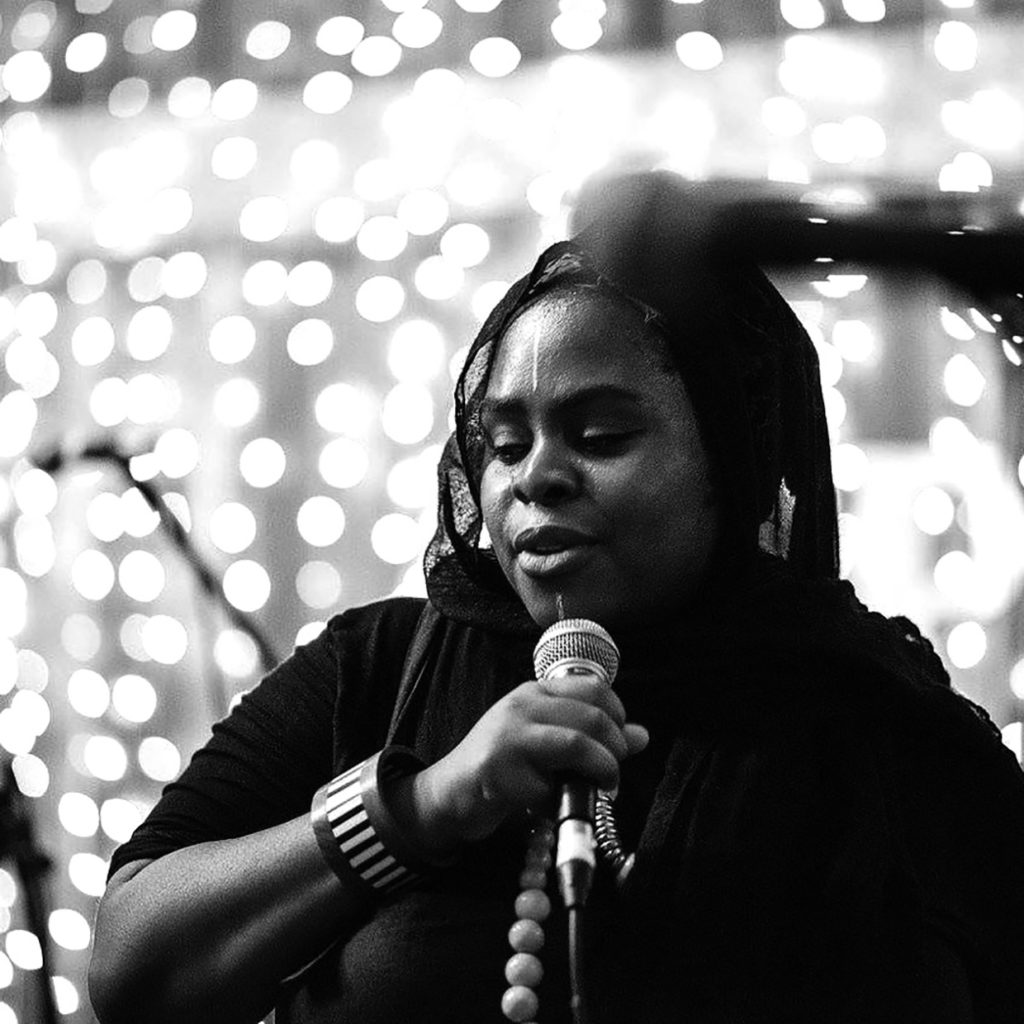
Muneera Williams
Poetic Pilgrimage
After they were inspired by the autobiography of the civil rights activist and Black revolutionary, Malcolm X, Muneera Williams and Sukina Douglas who formed hip-hop duo Poetic Pilgrimage, converted to Islam in 2005 only three weeks after the 7/7 bombings in London. Though they no longer perform together, both Sukina and Muneera continue with their artistry through solo work as playwrights, spoken word poets and other creative projects. The former duo have immortalised their status as hip-hop pioneers who unapologetically articulated the British Muslim and Black British experience through their music.
The influence of their Muslim identity, Caribbean and British heritage spills out from Poetic Pilgrimage’s cover of The Abyssinians’ ‘Satta Massagana’ in ‘Land Far Away’. It’s a reggae and hip-hop fusion which seamlessly melds the curling smoke of burning incense as a shopkeeper with dreadlocks sells his pungent wares, a glimpse of a sepia photo of Sojourner Truth, the African American abolitionist and women’s rights activist, Islamic references to Jannatul Firdaus (paradise), the Middle Passage of slavery, and a reference to halal Jamaican patties all in the same breath. To the eyes of a Muslim ignorant of the cultural practices of Afro-diasporic Black Muslims, such music could mistakenly be labelled as ‘un-Islamic’. But as Muneera explains, though her race and sex were part of her identity, Islam was her foundation, the lens through which she saw her music:
Sometimes I feel like people look for codes and conventions. ‘Is she wearing the hijab? Does she look Muslim-ish? How does she dress?’ I may not mention ‘Oh God’ or ‘Oh the prophet Muhammad peace be upon him’. It’s almost as if you don’t look a certain way, if you don’t dress a certain way then you’ll be held up to, ‘Is this person even Muslim? Is this person even inspired by faith?’ As I look through the lens of faith, I have no choice but to be influenced by my faith. It’s just maybe how I express my faith isn’t going to necessarily be in codes and conventions people will understand. One of the reasons people are looking for these things is because they want something to hold onto. They want something to make them feel empowered in this time where we can feel so disempowered, when we look at how Muslims are being portrayed in the West and other Muslim countries. People are looking to find themselves.
Islamic references are replete in hip-hop vernacular. Early references allude to the Nation of Islam, Five Percenter philosophy (an offshoot of the Nation of Islam) of men as Gods and women as earths in the lyrics of Busta Rhymes and Erykah Badu. Mos Def, also known as Yasiin Bey, is a well-known example of a male Muslim emcee who merged his Sunni orthodox faith with his music, as can be heard in the opening line of his solo album ‘Black on Both Sides’: Bismillah Ar-Rahman Ar-Rahim, ‘In the name of God the most gracious, the most merciful’. Though word through the hip-hop grapevine whispers of her apparent conversion, multi-platinum rap artist Eve thanks Allah, not God, for turning away from her life as a stripper in her debut album. Even hip-hop legend Queen Latifah’s Muslim identified stage name nods to the entanglement of Black consciousness, hip-hop, and Islam. However, the relationship between Islam and hip-hop, says Khabeer, isn’t that well-known. It has, she says, ‘a lot to do with how hip-hop is seen as “Black music” which is configured around pathologies like poverty, criminality and sexuality. Islam and Muslims get pegged around sexuality and being very strict: there’s no music, and there’s no sex.’ Hip-hop is also inextricably bound with Islam because of its Jamaican, African, funk, and jazz roots. ‘“Knowledge of self”, is what Black Muslims gave hip-hop’, says Khabeer. ‘Although hip-hop has this commercial commodified side, as a genre, it’s always had this thread which is inspired by “knowledge of self”, of social protest, commentary, critique, of trying to build and imagine something different. Knowledge of self comes from the Black Muslim tradition, particularly the Nation of Islam and the honourable Elijah Muhammad. It’s a part of hip-hop music and culture. The “knowledge of self” is an ethical position about knowing your past which is usually hidden because you’re from a marginalised community.’
Hip-Hop ‘Dawah’
Islam also has a very strong tradition of poetry going back to the classical period. A whole chapter in the Qur’an (Surah Ashu’ara, 26) is dedicated to poets. Historically, poetry was used as a form of dawah to invite non-Muslims to accept Islam. The Prophet Muhammad himself commissioned poetry for Muslim poets to refute verbal challenges to Islam and to inspire conviction amongst Muslims. For Oakland-based emcee Alia Sharrief, hip-hop is an inheritance of this poetic mantle, such that the question of whether hip-hop is permissible or haram was obsolete.‘Hip-hop is rooted in Islam. It’s poetry slam. When the prophet Muhammad (peace be upon him) was delivering the message, they called him a poet. His time was the time of poetry, where people were basically rap battling’.
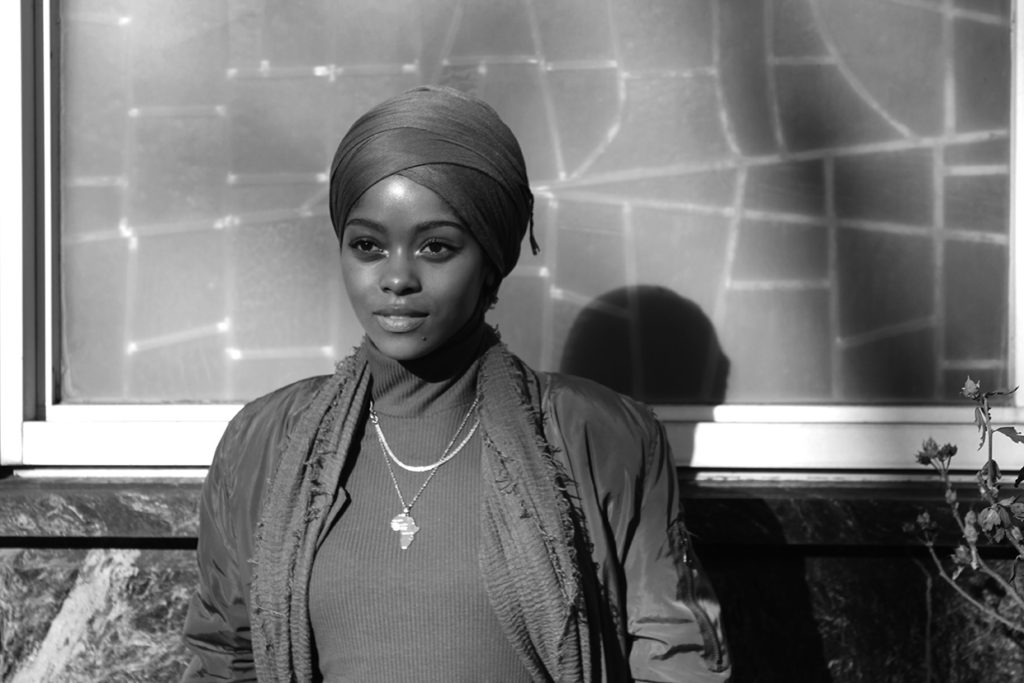
Model, writer, and Afrofuturist, Boshia Rae-Jean concurs. The New Jersey based emcee converted to Islam in 2015. Her debut song, ‘Q Knowledge’, begins with Bismillah hirahman nirahim, a nod to Mos Def’s opening to ‘Black on Both Sides’. Though there are no other explicit Islamic references (the music video expresses her passion for Afro-futurism and is set in a space-ship), Jean said the song was about reviving tradition of female scholarship with the chorus line, ‘Where you gonna get that knowledge?’. My music, she says, is about Muslim women seeking scholarship, defending their rights, not being afraid to say that’s not right. Think about all the prophets that women birthed, all of the leaders. The womb was a source of divine decree. Aisha, the wife of prophet Muhammad, narrated so many hadith. With that, she was able to teach more men scholars than a lot of men did at the time. We have to understand the power of a woman’s knowledge and her connection to Allah, really honour knowledge so you can utilise that to make new stories, utilise who you are as a woman to effect change.
Islam has a long, rich tradition of female Muslim intellectuals. The Oxford-based scholar Sheikh Akram Nadwi produced a forty-volume biography of more than 9,000 Muslim women who had narrated hadith, the traditions of the prophet Muhammad, taught in mosques, and issued fatwas over the centuries, just in the field of hadith alone. Some of the most notable intellectuals such as Al Ghazali and the imams of the four major schools of thought within Sunni Islam, attended the classes of Muslim women from Jerusalem, Syria, and Arabia. As Jean rightly points out, Aisha, the wife of the prophet Muhammad was a formidable scholar herself. Muslim women like Nana Asma’u (1793–1864), the Hausa-Fulani poetess, Islamic scholar and revivalist from northern Nigeria continued this tradition well into the nineteenth century. In the present day, the Egyptian songstress Umm Kulthum whose father was an Islamic scholar, began performing as a qariah, a female Qur’an reciter. The indomitable Pakistani singer, Abida Parveen, comes from a distinguished family of scholars and qawwali singers.
Carrying the mantle of the great female Muslim scholars and artists who came before her, Jean considers her role as a Muslimah emcee being a way of manifesting a different space for thinking, moving from traditional expectations around gender which dictate how women should behave both within and beyond the Muslim community. She sees Islam as struggle against injustice:
We grow up in families that say, ‘Oh, you shouldn’t speak too loud’ or ‘You’re a woman, you should do this’. But hip-hop says ‘no’. Hip-hop says fight for your rights. Don’t sit there and be meek. Islam teaches us that as well, to fight for justice. Don’t sit there and let it continue, because then you’re oppressing yourself, your community. That’s the foundation of hip-hop. Islam is literally in hip-hop.
Ain’t Afraid
The identical twins and hip-hop duo, Ain’t Afraid, who go by the stage names Straingth and Wizdumb, were home schooled. They had to help support their younger siblings and their mother, a single parent who worked long hours. During those days, music was their catharsis and escapism. Their mother, Umm Ain’t Afraid, a former rapper herself, injected optimism into their musical diet from a young age with Michael Jackson and Whitney Houston, a buoyancy, which diffused into the twins’ own creativity. ‘As the oldest siblings’, says Straingth, ‘we had to take a lot of responsibility. Taking care of the kids, the household while our mother worked. In that time, we used music and dance routines to cope through the misery: feeling alone, times we used to feel trapped from all the things we were going through. Music was a sweet space. We felt peace and freedom’. At their high school in Dearborn, Michigan, they were given the title, ‘The Twinsz’. Though they are now known as Muslimah emcees, they sang, recited poetry and performed in class, school halls and talent shows. Their prolific grassroots activism and advocacy on runaway and homeless youth, gentrification, and Black Lives Matter cemented their status in the community not just as performers but as young, socially engaged leaders. A year after they left high school, The Twinsz became more serious about their faith. They began listening to lectures from Muslim scholars such as Mufti Ismail Menk, Imam Bilal Phillips, spoken-word poetry by Boona Mohammad, and acoustic nasheeds by the well-known three-man band, Native Deen. All the people we came across, says Wizdumb, were ‘men, men, men. On top of that, if they were artists, they were still men. We didn’t really know about women artists’.
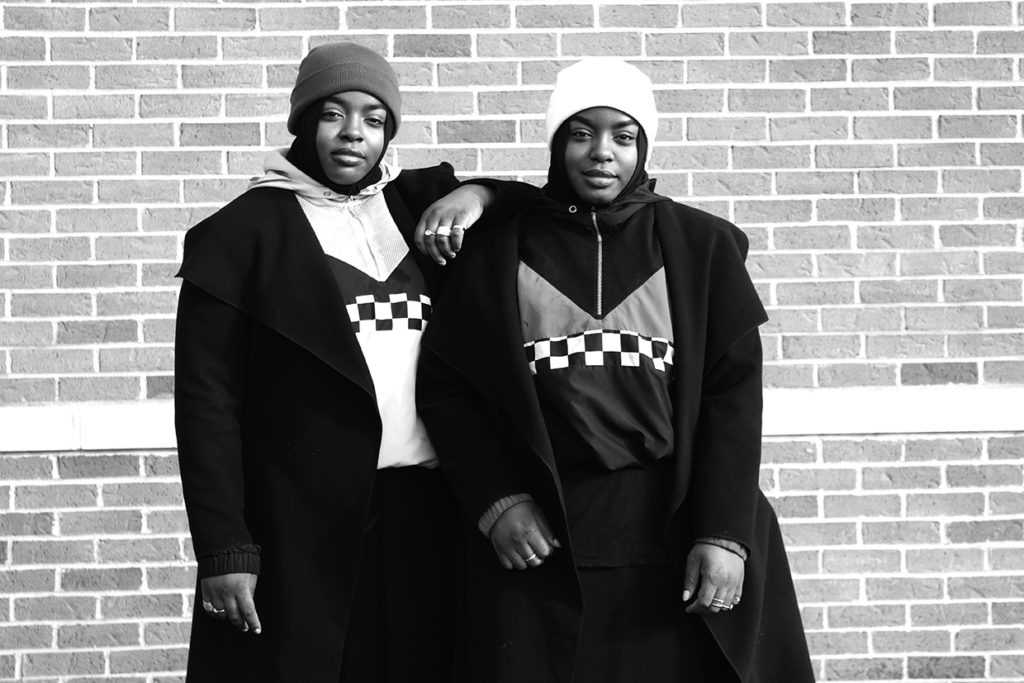
As young, Black Muslim women themselves, they found that not only were Muslim women not given a visible platform for other young women to aspire to, but that many of their peers were struggling to reconcile their Muslimness and Americanness. Using the lyrical sails of their mother who helped orchestrate the synergy between their faith and their music, they set out to create a narrative by and for Muslim women, to instil unapologetic pride that embraced their Muslimness, their Blackness, and their American identity. And so when hip-hop became a part of their musical vocabulary in 2018, Ain’t Afraid, which stands for ‘Ain’t Another Faith Rapping As Islam Does’, was finally born; and a form of hip-hop dawah. Wizdumb says:
We were Straingth and Wizdumb before we were Ain’t Afraid. It embodies everything we are: being unapologetic and comfortable. Ain’t Afraid is a little contradictory. We’re not absence of fear, we have fear. It’s about courage. It means when you’re being challenged, to challenge back. It’s about braving the fear and not being afraid of who we are. We realised young Muslims, especially sisters, needed to see you can live a dope life and still value your religion. That it is possible. So many young sisters ask us, ‘How are you guys so cool, and still so Muslim?’ For us, that was our life. Our mother brought us up on that.
With a following of over 113,000 on Instagram, their music, explicitly Islamic in its lyrical content, is rooted in the remembrance of Allah. With synchronised recitations and brightly coloured hijabs, they address the ‘Muslim baes’ of Instagram, summarising uplifting narrations from the prophet Muhammad, exploring the 99 names of Allah, directly addressing the Christchurch massacre victims, and creating Islamic renditions of nursery rhymes such as ‘Row, Row, Row Your Boat’ which they reprised as ‘Ra, Ra, Ramadan’. Their first song ‘Take Me To Makkah’ is about performing the hajj and seeing the Kabah for the first time. Through their music, Ain’t Afraid display not just a commitment to their religious beliefs as Muslims, but also social advocacy and politics. ‘We need to be talking about things other people are afraid to talk about’, says Straingth. ‘Racial issues effect your Muslim brothers and sisters, so you should be concerned about that. Housing displacement affects Muslim brothers and sisters. War. Immigration’. In response to Donald Trump’s racist tweets last year that ‘The Squad’ – congresswomen Rashida Talib, Ayana Presley, Ilhan Omar and Alexandria Ocasio-Cortez, all women of colour – should ‘go back’ to other countries, they penned ‘Trumped’. With the star-spangled banner of the American flag draped on the back of their mother’s car seat, they plunge into an immaculate rap about the Middle Passage, slavery, and Melania Trump’s own immigrant status:
Once they began building a following on Instagram, the duo had also built a growing non-Muslim audience. What started out as primarily Islamic hip-hop for a Muslim audience created an opportunity for Ain’t Afraid to educate non-Muslims about Islam and universalise the Muslim experience through the language of rap. ‘The prophet Muhammad’, says Straingth,‘was an advocate for all people. Allah sent the prophet SAW as a mercy to mankind, not just as a mercy to this Ummah, to just Muslims. As Muslims, we need to embody that message as well. The prophet came for that purpose, and we’re supposed to carry out what he came for. So we (Ain’t Afraid) advocate for all people.’
There is a lot of ‘unsettledness’ around the question of religious authority in America and who is the rightful arbiter of knowledge. But the music of Ain’t Afraid and indeed other Muslimah emcees is resonating with the Muslim diaspora around the world, both in its Islamic and cultural significance. It is for this reason hip-hop remains the genre of Ain’t Afraid’s generation of emcees, who use hip-hop as a musical baton to demand social justice refracted through the lens of their faith. Khabeer notes:
Young Muslims are engaging with hip-hop music and culture because they’re finding Islam in it. They’re also finding a way to be Muslim that is really engaging in activism and challenging with inequality. It’s not surprising that people who are the intersection of multiple oppressions, religious, gender, race class, would be drawn to or attracted to a music that comes from their own community and experiences, as a way to respond, express and intervene. With a conscious hip-hop, they are interpreting the world, diagnosing it, and providing the remedies, that’s what their music is trying to do.
The Legacy of Lauryn Hill
In 1998, the masculinist hip-hop landscape changed irrevocably with the release of ‘The Miseducation of Lauryn Hill’. Lauryn Hill eloquently sermonised with her music on how to reconcile love in all its iterations: love of self, unrequited love, navigating heartbreak with Ex-Factor, and the unconditional love of motherhood. The post-civil rights, post-third-wave feminism milieu her music emerged from was the catalyst that begat what hip-hop journalist and author, Joan Morgan, dubbed as ‘hip-hop feminism’. From Hill’s razor-sharp lyricism and velvety alto voice, a prophetess of tenderness and rage was born offering a liberation theology of the heart for Black women. A morally conscious, empowering hip-hop was resurrected by a single woman’s voice. The opening lyrics of her ‘Doo-Wop (That Thing)’, the first number one single by a female hip-hop artist in history, begins with a well-known Islamic phrase Muslims utter every day whilst performing their five daily prayers.
Hill’s invocation of Siraat Al-Mustaqim, a phrase, referenced thirty-three times in the Qur’an, was more than just a cocktail of intelligent punchlines mixed with spirituality. She dipped her lyrical pen into hip-hop vernacular that had been in dialogue with Islam since the genre’s inception on the streets of South Bronx, New York City in the 1970’s. For Miss Undastood, this unlikely marriage between hip-hop and spirituality passed on the baton to Muslim emcees like her, opening the lyrical floodgates to merge the two and create a genre that not only appealed to the Islamic ethos and practices of Muslims but was also culturally relevant. Lauryn, she says, was infusing spirituality into music. ‘That is what I really connected with. She was putting some scriptures here and there and dropping some Islamic words. It was hip-hop and spirituality together, which is what I’m doing: Infusing hip-hop along with Islamic messages.’
From the beginning, Miss Undastood’s lyrics have fearlessly prodded at taboo social issues within the Muslim community. If there was an elephant in the room, Miss Undastood was the verbal assassin who fearlessly pursued it:
I’m always speaking about topics that people don’t want to talk about, like domestic violence. People want to pretend it don’t exist; they sweep it under the rug. I’m probably the only one who has no trouble talking about my experience after 9/11, dealing with discrimination, trying to get jobs. I’m the one whose gonna talk about sexism, gender bias, racism, polygamy, about child support. I’m the one choosing to speak on so many issues where people are like, ‘Hush! Hush! Hush!’
Instagram has become the newest medium to share her freestyles, Islamic covers of popular songs about her battles to secure child support and raise her daughter as a single mother against the backing track of Lauryn Hill’s ‘Lost Ones’, amongst other themes. The ricochet lyricism of ‘Queen’s Best Kept Secret’ is unrivalled as she raps in one of her freestyles donning a butter-yellow silk hijab.
For Alia Sharrief, Hill’s music planted a seed that helped her cultivate her own musical journey and empowered her to narrate the story of her Black and Muslim womanhood:
What Lauryn offered was so real. She offered so many jewels to the next generation to do better in a music industry where sex sells. Fast forward to the future, have we ever seen another Lauryn Hill? It’s so hard to be a righteous woman in the music industry, trying to deliver a message that uplifts women. When I met Lauryn, I told her, ‘I feel like I’m your daughter. Everything I’m doing is because I had someone like you to listen to when I was a little girl’. She grabbed my hand and said, ‘Hopefully I planted the seed for you to grow’.
Change Gonna Come
Almost a year after it was announced that a police officer who, on 9 August 2014, fatally shot the eighteen-year-old Black teenager Mike Brown in Ferguson, Missouri, would not face federal charges, it was Alia Sharrief’s wedding day. Ferguson became a seismic moment which cast a searching international spotlight on police accountability, and yet another post-mortem of race relations in the United States. Inspired partly by Ferguson, Sharrief’s song ‘Black Heroes’, which she performed with Aminah Bel, saluted the long history of Black radicalism and Black excellence. Ferguson for Sharrief was a harrowing reminder that her music was a weapon to ‘fight the power’ as the infamous Public Enemy chorus-line goes. ‘Mike Brown reminded us of Oscar Grant who was killed here in Oakland, at Fruitvale Bart Station’, she says. ‘It happened so many years ago, but it will always stay with us. I believe in that hadith, that if you see anything wrong you’ve got three things to stop it with: Your tongue, your hands, and your heart. I wanna be good on the day of judgement, so I gotta speak the truth.’
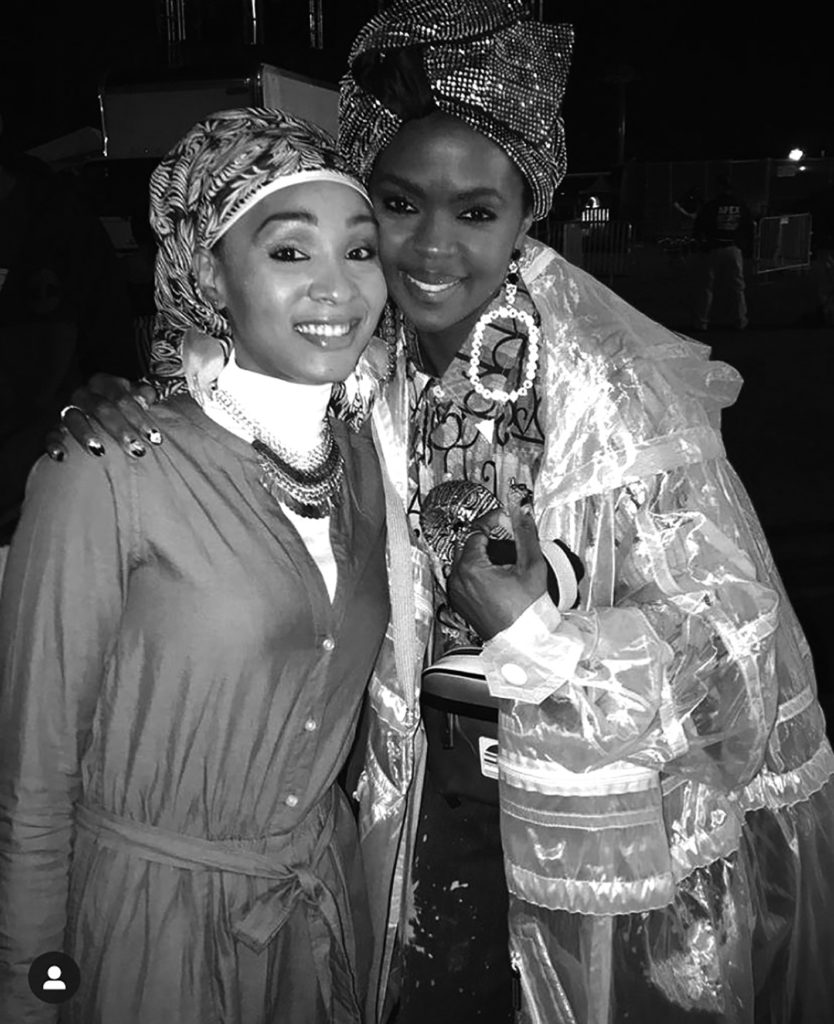
For Sukina, hip-hop whether British or American in its articulation, was not just embedded within the context of the African-American tradition. She saw Poetic Pilgrimage’s music as part of the African diasporic, post-slave communities that flowed across the Black Atlantic, utilising music as a weapon with a political undercurrent whether in its jovial and light-hearted forms as in subversively powerful Caribbean calypso music which originated in the struggle for emancipation from slavery, or its more sombre articulation as in Billie Holiday’s ‘Strange Fruit’, or in popular reggae music as in Bob Marley’s ‘Redemption Song’ where he quotes Marcus Garvey. ‘Even though hip-hop coagulated in America, its pieces came from the Afro-Caribbean tradition, the Afro-Jamaican tradition, the Afro-Latino tradition, and the African American tradition in that melting pot in New York at the time. It would be unjust to look at it in the context of just the American tradition. A lot of forefathers of hip-hop were also Afro-Caribbean. I don’t see myself as being less a part of the conversation on hip-hop’, she says.
Though Muneera also saw her music asa continuation of hip-hop’s legacy of protest, dissent and demands for social justice, simply viewing her music through a lens of resistance and a singular narrative that captured only the Black British Muslim experience would obscure the heart she poured into her art that gave voice to one story in the taxonomy of human experience.
‘Being black in this era’, Sukina says, ‘you are forced to see things through a lens. I wasn’t trying to make protest songs, I wasn’t trying to be empowering or talk about social justice and inequality. I was speaking from my heart about what I was witnessing. When you see what people around you are going through, is it some kind of social or political theory that we’re trying to put out there, or is it that we just care? Do I think what I do is from a legacy of protest and dissent? Truth to power and truth to the people? Yeah, I think it’s all of these different things. But we’re living in a world which wants us to have dominant narratives. And when you come with something different to that, you’re not trying to speak the truth. You’re just telling your story.’
From the slave plantation songs in the Deep South to the streets of New York’s South Bronx, Black American expressive culture in music has maintained a position of resistance for centuries. Hip-hop endures as the musical arsenal of choice for a new generation of Muslimah emcees who are building online and real-life communities with their music. Their very existence is a form of resistance that transcends centuries of victimhood of racial oppression. They are nurturing and utilising a potent vehicle of expression, power and catharsis not just for themselves, but for the future generations of Muslimah emcees to come.